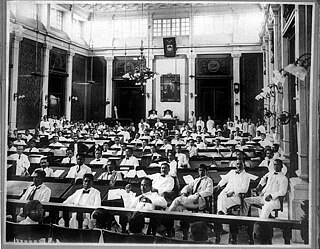
A senate is a deliberative assembly, often the upper house or chamber of a bicameral legislature. The name comes from the ancient Roman Senate, so-called as an assembly of the senior and therefore allegedly wiser and more experienced members of the society or ruling class. Thus, the literal meaning of the word "senate" is Assembly of Elders.
A member of parliament (MP) is the representative of the voters to a parliament. In many countries with bicameral parliaments, this category includes specifically members of the lower house, as upper houses often have a different title. Member of Congress is an equivalent term in other jurisdictions.
A bicameral legislature divides the legislators into two separate assemblies, chambers, or houses. Bicameralism is distinguished from unicameralism, in which all members deliberate and vote as a single group, and from some legislatures that have three or more separate assemblies, chambers, or houses. As of 2015, fewer than half the world's national legislatures are bicameral.
In government, unicameralism is the practice of having one legislative or parliamentary chamber. Thus, a unicameral parliament or unicameral legislature is a legislature which consists of one chamber or house.
Legislative assembly is the name given in some countries to either a legislature, or to one of its branches.
A legislative council is the legislature, or one of the legislative chambers, of a nation, colony, or subnational division such as a province or state; or, in the United States, a council within a legislature which supervises nonpartisan legislative support staff. A member of a legislative council is commonly referred to as an MLC.
Tricameralism is the practice of having three legislative or parliamentary chambers. It is contrasted with unicameralism and bicameralism, both of which are far more common.

The speaker of a deliberative assembly, especially a legislative body, is its presiding officer, or the chair. The title was first used in 1377 in England.

A Landtag is a representative assembly (parliament) in German-speaking countries with legislative authority and competence over a federated state (Land). Landtage assemblies are the legislative bodies for the individual states of Germany and states of Austria, and have authority to legislate in non-federal matters for the regional area.
A joint committee is a committee made up of members of both chambers of a bicameral legislature. In other contexts, it refers to a committee with members from more than one organization.
An upper house is one of two chambers of a bicameral legislature, the other chamber being the lower house. The house formally designated as the upper house is usually smaller and often has more restricted power than the lower house. Examples of upper houses in countries include the Australian Senate, Brazil's Senado Federal, the Canadian Senate, France's Sénat, Germany's Bundesrat, India's Rajya Sabha, Ireland's Seanad, Malaysia's Dewan Negara, the Netherlands' Eerste Kamer, Pakistan's Senate of Pakistan, Russia's Federation Council, Switzerland's Council of States, United Kingdom's House of Lords and the United States Senate.
A legislative chamber or house is a deliberative assembly within a legislature which generally meets and votes separately from the legislature's other chambers. Legislatures are usually unicameral, consisting of only one chamber, or bicameral, consisting of two, but there are rare examples of tricameral and tetracameral legislatures.
A Member of Legislative Assembly (MLA) is a representative elected by the voters of an electoral district (constituency) to the legislature of the State government in the Indian system of government. From each constituency, the people elect one representative who then becomes a member of the Legislative Assembly (MLA). Each state has between seven and nine MLAs for every Member of Parliament (MP) that it has in the Lok Sabha, the lower house of India's bicameral parliament. There are also members in two unicameral legislatures in Union Territories: the Delhi Legislative Assembly and Puducherry Legislative Assembly.

The Philippine Legislature was the legislature of the Philippines from 1907 to 1935, during the American colonial period, and predecessor of the current Congress of the Philippines. It was bicameral and the legislative branch of the Insular Government.
A term of office is the length of time a person serves in a particular elected office. In many jurisdictions there is a defined limit on how long terms of office may be before the officeholder must be subject to re-election. Some jurisdictions exercise term limits, setting a maximum number of terms an individual may hold in a particular office.

The Legislature of the Kingdom of Hawaii was the bicameral legislature of the Kingdom of Hawaii. A royal legislature was first provided by the 1840 Constitution and the 1852 Constitution was the first to use the term Legislature of the Hawaiian Islands, and the first to subject the monarch to certain democratic principles. Prior to this the monarchs ruled under a Council of Chiefs.






